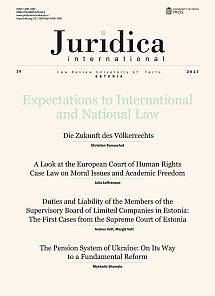A Look at the European Court of Human Rights Case Law on Moral Issues and Academic Freedom
DOI:
https://doi.org/10.12697/JI.2017.26.04Keywords:
European Court of Human Rights, ethics, human dignity, beginning of life, end of life, abortion, surrogacy, right to die, withdrawal of life-sustaining treatment, academic freedomAbstract
Ethics is constantly topical, and times of economic crises, issues of migration and refugees, and threat of terrorism are no exception. In almost all cases brought before it, the European Court of Human Rights in Strasbourg faces morally oriented issues to some extent. The article examines key dimensions of ethics as addressed by it (the common ethical grounds and European values on which the decisions are often based; areas of differences in ethical grounds in cases wherein no European consensus on a given issue seems to exist; and the independence, impartiality, and internal ethics of the Court and its judges), and it discusses some central topics related to moral issues in its case law.
The case law addresses matters from serious human‑rights violations to rights of prisoners and refugees, but the article pays particular attention to case law defining human dignity, which is closely connected with ethics. It elaborates on the beginning of life and reproductive rights: cases have dealt with access to lawful abortion, embryo donation and scientific research, home birth, medically assisted procreation, precautionary measures to protect a newborn baby’s health, prenatal medical tests, sterilisation, surrogacy, and an unborn child’s right to life. With regard to the end of life, the Court has found that the right to life could not, without a distortion of language, be interpreted as conferring the diametrically opposite right, a right to die. The article also considers the delicate issue of withdrawal of life-sustaining treatment. Also considered is the case law related to freedom of research and the responsibility of researchers and universities, with focus on the essence of academic freedom and morals, classical and other types of cases in connection with questions related to procedural rights before the Court that involve academic freedom, and the use of research results and academic freedom. The author presents conclusions related to the careful, pragmatic balancing among rights, between European and state level, and of public and private interests. There need not be a ‘European ethics’, but there certainly exist certain common values and understandings.


